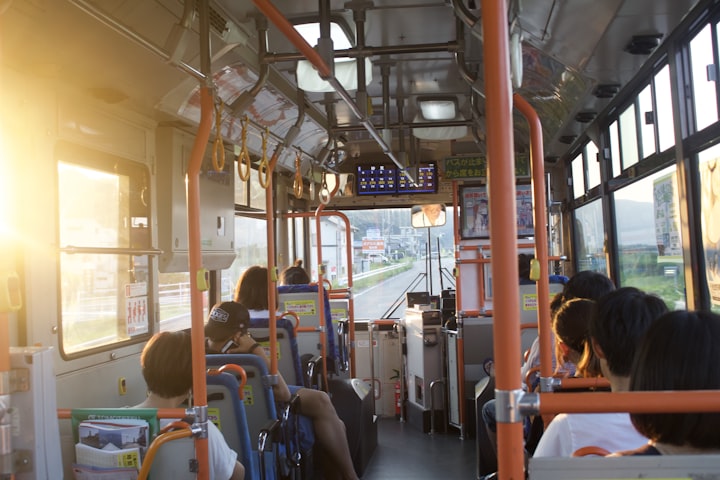Riding Buses in the Cities I Call Home
Living abroad has taught me lessons about many ways people socialize. Riding buses in different cities shows a clear difference in the way of life of the locals.
My first ever bus riding experience in Japan was a bit funny and confusing. Although buses are a common public transportation everywhere in the world, I didn’t know that here in Japan, public buses have two doors--each for getting on and off the bus. I used to ride buses everyday back in my hometown, Ambon, Indonesia. As it was the main transportation means used by my family. However, ever since I came to Japan, I always ride a bicycle everywhere, and only ride buses when going to more distant places.
Riding buses in Ambon and Higashihiroshima feels completely different to me. Each experience taught me about the story of each society: its culture and its people.
Buses in Higashihiroshima are larger than than those in Ambon. A bus can load up to around fifty passengers. Given such a space, passengers can freely choose where to sit. Riding buses in Higashihiroshima made me realize about several behaviors of the passengers that I found quite unique. Most passengers here tend to avoid sitting next to strangers. Whether it's looking for an empty seat at the very back of the bus or standing all the way, everyone here seem a bit hesitant to sit next to a stranger.
Here in Higashihiroshima, when someone gets on the bus, I noticed, that person will immediately start touching their cell phone. Either scrolling down a newsfeed or setting up earphones for some music. For some elderly passengers, instead of smartphones, they tend to look out the window or read a novel carried in their carry-on bag, silently. I almost never saw passengers chatting on a bus. Everyone here knows that they shouldn’t make a noise and disturb other people. This includes, not to speak with other passengers or answering a phone call on the bus. The only noise allowed is the voice of a lady speaking from the bus' speaker telling you where the next stop is and remind you to watch your step when getting off the bus, so you don’t fall. A kind of information that doesn't seem very necessary and useful to locals who already used to ride the bus every day.
On the other hand, unlike Higashihiroshima, buses in Ambon are smaller. One bus can only carry ten passengers. Because the bus is small, everyone have to remain seated facing each other all the way. It also has small windows behind the passenger seat where the breeze come through. Interestingly, despite of such a cramped space, bus passengers in Ambon found their ways to enjoy the ride. As most of them are from the same neighborhood, even if some may not really know the other, they like to talk on the bus. Mostly, they are the housewives asking each other about how much the price of fish or onion is in the market.
Ambon is located in a small island in Eastern Indonesia, an island where people enjoy talking so much like nowhere else in the world. People in Ambon also build a terrace in front of their houses, as well as community gazebos here and there where people from the neighborhood can spend their leisure times catching up with each other—this includes exchanging jokes, playing music, talking about politics, sports, and all interesting stuffs you can imagine. It seems that the Ambonese habit of casually talking to one another carried over even on the bus.
Moreover, riding buses in Ambon is an enjoyable musical experience as well. Not only do the people love to talk and socialize, they also love to enjoy music as well. Ever since portable speaker was available in Ambon, and even long before the city was announced as a City of Music by UNESCO in 2019, music plays an important part of the society. Even bus drivers in Ambon are allowed to play their favorite songs on the bus loudly, for all passengers to enjoy along the way. I can vividly remember listening to masterpieces from all around the world during a twenty minutes commute to school. From Elton John, Westlife, Michael Learns to Rock, to Ambonese pop stars like Glenn Fredly and Utha Likumahuwa. These are the kind of music my father would always play at home during our nap time.
Of course, neither is better or worse about riding buses in each city. Both taught me lessons about the norms and customs of the society. Riding buses in Ambon showed me how people there are friendly and easy to talk to. And that their knowledge of music is so broad for people living in a small island. In contrast, riding buses in Higashihiroshima gave me a clear image of how respectful the people are. It is a concrete example of the Japanese philosophy of telepathy or the ishin-denshin, where people are ‘feeling’ each other that they tend to avoid doing anything that may disturb others.
As what I believe, people on the bus are honest projections of the society. If you want to know more about a new city you are visiting, try not to spend the whole vacation only in a nice hotel or famous tourist spots. Riding local buses is the perfect way to get to know the people and the society. There are lots of cities I wish to visit in the future. When the opportunity comes, I will make sure to spend at least a day just to get around the city riding local bus.
About the Creator
Denise Sahulata
International student residing in Japan. Studying sciences, but also interested to cultures and languages.







Comments
There are no comments for this story
Be the first to respond and start the conversation.